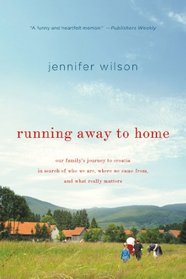Karen K. (krin) reviewed Running Away to Home: Our Family's Journey to Croatia in Search of Who We Are, Where We Came From, and What Really Matters on + 407 more book reviews
I enjoyed this book of not only researching family history, but living in the ancestors' home village and meeting new relatives. I liked how Jen learned not to stand outside as an observer but instead participate in daily activities, thus making new and valued friends.
Review first published on my blog: http://memoriesfrombooks.blogspot.com/2011/11/running-away-to-home.html
Running Away to Home is part travel journal, part history book, and part family memoir. The author, Jennifer Wilson, is a travel writer from Des Moines, Iowa. One summer she, her husband, and their two children move to the village Markopalj in Croatia. The intent is for Jennifer to research her Croatian ancestors / genealogy and to experience a lifestyle very different from theirs. The family spends several months living with and getting to know this village, its history, and its people.
As a travel and history journal, the book tells a lot Croatian geography and history. It tells about the division of its people through wars and its survival through those situations. It delves into the political history - Croatians, Serbs, Yugoslavia, Communism. It delves into the economic history, focusing on the fact of young people leaving because of a lack of jobs. It even presents the social history, repeatedly making a point of the importance of drinking and alcohol to this community. The book weaves in Jennifer's search for her own ancestors throughout this history.
The story of Jennifer's own family and their time in Croatia seems secondary to the history unfortunately. At one point, the book states about her husband, "He was making his own discoveries that he would reveal to me later." Sadly, that is not part of this book, and his perspective is not addressed in the book. The point is made many times that he seemingly has an easier adjustment into the Croatian life even though he has transitioned from being an architect to a stay-at-home father homeschooling his children. Unfortunately that aspect of the story is not explored. The two children, very young at the time, seem extensions of the adults. They seem present in the story but at the periphery.
The story of a family moving from modern day America to a village that seems to be from a different time was the one the book seemed to promise. What it delivered was a snapshot of Croatian history.
*** Book reviewed for LibraryThing Early Reviewers Program ***
Running Away to Home is part travel journal, part history book, and part family memoir. The author, Jennifer Wilson, is a travel writer from Des Moines, Iowa. One summer she, her husband, and their two children move to the village Markopalj in Croatia. The intent is for Jennifer to research her Croatian ancestors / genealogy and to experience a lifestyle very different from theirs. The family spends several months living with and getting to know this village, its history, and its people.
As a travel and history journal, the book tells a lot Croatian geography and history. It tells about the division of its people through wars and its survival through those situations. It delves into the political history - Croatians, Serbs, Yugoslavia, Communism. It delves into the economic history, focusing on the fact of young people leaving because of a lack of jobs. It even presents the social history, repeatedly making a point of the importance of drinking and alcohol to this community. The book weaves in Jennifer's search for her own ancestors throughout this history.
The story of Jennifer's own family and their time in Croatia seems secondary to the history unfortunately. At one point, the book states about her husband, "He was making his own discoveries that he would reveal to me later." Sadly, that is not part of this book, and his perspective is not addressed in the book. The point is made many times that he seemingly has an easier adjustment into the Croatian life even though he has transitioned from being an architect to a stay-at-home father homeschooling his children. Unfortunately that aspect of the story is not explored. The two children, very young at the time, seem extensions of the adults. They seem present in the story but at the periphery.
The story of a family moving from modern day America to a village that seems to be from a different time was the one the book seemed to promise. What it delivered was a snapshot of Croatian history.
*** Book reviewed for LibraryThing Early Reviewers Program ***




![header=[] body=[Get a free book credit right now by joining the club and listing 5 books you have and are willing to share with other members!] Help icon](/images/question.gif?v=90afaeb39)
